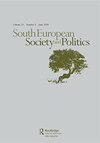评估年龄、队列和时期对党派倾向和主流政党支持的影响:来自南欧的证据
IF 4.6
1区 社会学
Q1 POLITICAL SCIENCE
引用次数: 3
摘要
本文考察了南欧国家的时间效应与脱盟之间的联系,这使我们能够评估欧元危机期间该地区政治不稳定的短期和长期因素的相对重要性。首先,我们分析了生命周期、群体和时期对各国党派认同的影响。其次,我们调查了时间相关因素在多大程度上对主流政党的选票侵蚀负责,特别是在危机时期,从而孤立了时间对政党制度变化的一般模式的影响。我们的研究结果表明,选举和党派的分歧尤其受到时期效应的影响,而年龄和群体差异的作用则更为有限。此外,在时间效应的演变和强度方面,各国之间也存在重要差异。本文章由计算机程序翻译,如有差异,请以英文原文为准。
Assessing the Impact of Age, Cohort and Period Effects on Partisanship and Support for Mainstream Parties: Evidence from Southern Europe
ABSTRACT The article examines the link between time effects and dealignment in Southern European countries, which allows us to assess the relative importance of short- and long-term factors on the political instability of the region during the Eurocrisis. First, we analyse life cycle, cohort and period effects on partisan identities across countries. Second, we investigate to what extent time-related factors have been responsible for the erosion of the vote in mainstream parties, especially during the crisis period, thus isolating the impact of time on general patterns of party system change. Our results show that electoral and partisan dealignment is fostered in particular by period effects, whereas age and cohort differences play a more limited role. In addition, there are also important differences across countries in terms of both evolution and intensity of time effects.
求助全文
通过发布文献求助,成功后即可免费获取论文全文。
去求助
来源期刊

South European Society and Politics
Multiple-
CiteScore
5.80
自引率
21.20%
发文量
14
期刊介绍:
A leading point of reference for scholars of Southern Europe, South European Society and Politics promotes both comparative and inter-disciplinary analyses, as well as offering innovative single county and sub-national studies. The journal acts as a forum for social, economic, cultural, contemporary historical and political approaches to research on the region, and is particularly keen to sponsor policy–focused studies in all these disciplines. The journal publishes research articles; South European Atlas with election reports and articles on other subjects of topical interest, and an extensive book reviews section, including both review articles and individual book reviews.
 求助内容:
求助内容: 应助结果提醒方式:
应助结果提醒方式:


